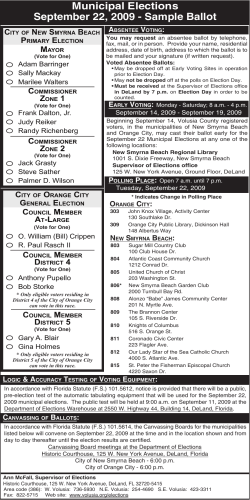
COUNTY OF VOLUSIA
COUNTY OF VOLUSIA SUSTAINABLE VOLUSIA ENERGY EFFICIENCY AND CONSERVATION STRATEGY As part of the EECBG Program COUNTY OF VOLUSIA ENERGY EFFICIENCY AND CONSERVATION STRATEGY As part of the EECBG Program Introduction In 2009 the Energy Efficiency and Conservation Block Grant (EECBG) Program was funded under the American Recovery and Reinvestment Act (ARRA) of 2009. Through direct funding, Volusia County received more than $2.4 million for energy sustainability objectives and job creation under the United States Department of Energy (US DoE) priorities. Those priorities include: energy conservation, renewable energy generation, Greenhouse Gas (GHG) emissions reduction, cost savings for reinvestment, and creation and/or retention of jobs. Volusia County’s Energy Efficiency and Conservation Strategy As part of the EECBG grant application process, Volusia County has created a strategy to use the EECBG funds to invest in multiple eligible energy efficiency activities that will result in substantial reductions in energy usage and costs while providing long-term sustainable benefits to the community as a whole. The county’s strategy has seven measurable goals and objectives. 1. The first activity is to create an Office of Sustainability and Energy Management (OSEM) whose mission will be to collaborate with other county departments, businesses, non-profits and other partners to ensure the long-term economic, social, and environmental sustainability of Volusia County. OSEM will act as the central source for all Volusia County sustainability efforts as well as the management of all grant related responsibilities under the EECBG and ARRA. The office will be staffed with the equivalent of three full-time staff members, a Sustainability Manager, a Sustainability Associate, an Energy Manager, and a part-time Administrative Coordinator. A second component of Activity 1 is the Volusia County Environmental Service Learning Project which will provide a hands-on environmental learning experience for students which will incorporate important fundamental studies such as Math, Social Studies and English in a holistic fashion. Students will learn to read an electric meter, and understand the kilowatt hour usage and the electric cost for a family for a month. Students will be able to identify the environmental impacts of this type of energy consumption. 2. The second activity will be to procure the services of an Energy Service Company (ESCO) utilizing one of ten companies currently under Florida state contract. Volusia County will use the ESCO to conduct an investment grade energy audit of 11 key county facilities which have considerable total square footage (over 1.6M square feet) and energy usage of approximately 30 million kWh. In addition, the ESCO will identify energy efficient facility retrofits and improvement measures, provide the costs associated with each, the cost-benefit analysis for each retrofit (including long term financial and energy savings), and a mechanism for determining the possible payback County of Volusia – Sustainable Volusia Energy Efficiency and Conservation Strategy 1 through performance contracting. The buildings that will be included in the energy audit and retrofit plan include: Justice Center, Courthouse Annex, City Island Library, Branch Jail, Correctional Facility, Health Department, Ocean Center (convention center), County Administration Buildings, the Volusia County Courthouse, and the County Airport. 3. The third activity is to hire a consulting firm to complete a comprehensive strategic energy efficiency and climate protection plan for all sectors of our county: local governments, businesses and residents. This strategic plan will be multifaceted and has two primary goals: Using baseline data on building energy usage, further data from EPA's Portfolio Manager and the ESCO's recommendations on energy efficient retrofits, the consultant will create a plan which will reduce the county’s energy usage, costs and GHG emissions. The plan will look beyond energy use in buildings and include water, energy/fuel, and waste usage. The consultant firm will complete as part of the strategic planning process a sustainable return on investment analysis in order to assign monetary values to the social, economic and environmental impacts of each option and to allow for a more comprehensive understanding of the options. After receiving this information, the Volusia County Council will set appropriate and aggressive percentage based reduction goals that it expects to achieve within appropriate time frames. Tools such as the ICLEI Cities for Climate Protection program will be used to determine goals. This will allow clear and accurate strategies to be created and implemented. The Council will set these objectives within two months after this portion of the strategic energy plan is completed. The plan will also address the long term energy sustainability of the county and address promotion of energy efficiency and conservation through every available and practical means including utilizing alternative energy sources, land management (carbon sequestration), traffic management systems, encouraging the development of green businesses and as a direct consequence, the creation and retention of jobs. The strategic plan will provide a framework for partnerships between the county, cities, higher education institutions, local utility companies, businesses and residents for the implementation of the plan and for leveraging appropriate funds to maximize the benefit to the community as a whole. 4. The fourth activity will be to implement appropriate energy retrofits and conservation programs as identified by the ESCO in the energy audit/retrofit identification process (Project Activity 2) and in the Strategic Energy Efficiency and Conservation Plan (Project Activity 3). 5. The fifth activity will be the establishment of an International Speedway Boulevard (ISB) Corridor Green Development Plan in partnership with major ISB corridor stakeholders to develop a comprehensive plan to reduce the green footprint of the corridor and increase the economic, social and energy sustainability of the area. Goals of the plan included, but will not be limited to, determining the feasibility of a commer- County of Volusia Energy Efficiency and Conservation Strategy Dona DeMarsh • 123 W. Indiana Avenue, DeLand, FL 32720• telephone: (386) 943-7029 • fax: (386) 740-5101 • [email protected] 2 cial recycling program along ISB, providing realistic locations for potential renewable energy projects (such as solar), development of public-private partnerships to increase the benefits to the ISB Corridor, identification of incentives to attract/expand green businesses along the corridor, strategy development to reduce traffic congestion along ISB through a Traffic Management System and public transportation, and the identification of potential funding sources for the implementation of the ISB Green Corridor. 6. The sixth activity will be to leverage Neighborhood Stabilization Program (NSP) funds with EECBG funds to maximize the sustainability of affordable housing purchased with NSP funds. 7. The seventh activity will be to create financial incentives for a Green Building Program. Volusia County will provide incentives for private developers to build energy efficient buildings or to retrofit existing buildings. The voluntary green building program includes: New residential construction; Residential retrofitting and remodeling; New commercial construction; Commercial retrofitting and remodeling; New construction for county owned facilities; Retrofitting, remodeling, and major expansions of county owned facilities. The incentives include: Fast track permitting; 50% rebate on building permit fees not to exceed $300 for a residential building permit, $1000 for a commercial building permit, and $2,500 for a land development application per project. Additional incentives include marketing for the inclusion of program participants on a County webpage dedicated to the program, promotional packages/logos, and press releases. To be eligible for the incentives a program participant seeking certification shall satisfy the following requirements in effect at the time of application: a. New residential construction shall be subject to the GHDS, LEED for Homes program, the NAHB National Green Home program, or the GBI new home designation; b. Residential retrofitting and/or remodeling shall be subject to GHDS, LEED for Homes program, the NAHB National Green Home program, or the GBI. The project shall meet the requirements for “remodeling” or “existing home” of the designation; c. New commercial or institutional construction, excluding expansion or remodeling of existing buildings, shall be subject to the Green Commercial Designation Standard of the FGBC, LEED for New Construction or derived USGBC LEED rating system, or the Green Globes environmental assessment system for new designs; d. Commercial or institutional retrofitting and/or remodeling shall be subject to the Green Commercial Designation Standard of the FGBC, LEED for existing buildings or derived USGBC LEED rating system, or the Green Globes environmental assessment system for existing designs; and County of Volusia – Sustainable Volusia Energy Efficiency and Conservation Strategy 3 e. Land development projects shall be subject to the Green Development Designation Standard of the FGBC, LEED for Neighborhoods and Developments rating system program or the NAHB development designation. County of Volusia Energy Efficiency and Conservation Strategy Dona DeMarsh • 123 W. Indiana Avenue, DeLand, FL 32720• telephone: (386) 943-7029 • fax: (386) 740-5101 • [email protected] 4
© Copyright 2026









